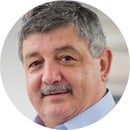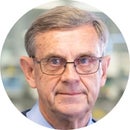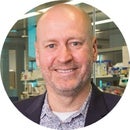How we help
Remembering Professor Don Metcalf an Australian cancer research hero
Internationally recognised as ‘the father of modern haematology’, Australian Professor Donald Metcalf was a Cancer Council funded researcher for more than 60 years. His pioneering work has left an incredible legacy, saving the lives of cancer patients across the world every day.
Professor Donald Metcalf is a true hero of Australian science. Known as the “father of modern haematology”, the late Professor Metcalf dedicated his research career at the Walter and Eliza Hall Institute in Melbourne to improving the lives of people undergoing cancer treatment.
Professor Nicos NicolaDon’s research has directly led to improvements in how chemotherapy and radiotherapy are delivered which has improved cure rates. It has certainly increased survival from cancer by preventing many side effects of cancer treatments which used to cause death and disability. Most importantly, he has shown us how you can achieve big things and tackle difficult problems through collaboration, persistence and focus."
Research colleague and laboratory head at the Walter and Eliza Hall Institute
Professor Metcalf began his research at the Walter and Eliza Hall Institute in 1954 with a Carden Fellowship in Cancer Research from Cancer Council. This support, and his partnership with Cancer Council, continued for the next fifty years of his research career.
Dr C. Glenn BegleyHis Cancer Council Fellowship guaranteed secure funding. He was able to tackle big problems that are not able to be tackled when funding is provided on a short term basis. This was a major factor in his discoveries, without this sustained support he would not have been able to undertake the work that he did."
Former PhD student, colleague and CEO of BioCurate Pty Ltd
His research focussed on understanding how blood cells are created in the bone marrow, research that held great potential for improving how people responded to one of the most common forms of cancer treatment, chemotherapy.
Chemotherapy is designed to search out and destroy cancer cells but in many cases it can also knock out healthy cells, especially the blood cells crucial to defending the body from harmful infections.
In the early 1960s, Professor Metcalf speculated that there must be something that turns on the blood cell production line. If this biological switch could be identified, it could be given to people affected by cancer to replenish their blood cell production and increase their ability to fight off infection without having to stop their cancer treatment.
Professor Tony BurgessDon aimed to discover a new biology. He wanted to understand the basic processes of cell production because he knew that many medical applications could come out of that work. The discovery of Colony Stimulating Factors took a long time and without the long-term support of Cancer Council, it may not have occurred."
Research colleague and laboratory head at the Walter and Eliza Hall Institute
Following years of painstaking research, Professor Metcalf and his research team did discover four switches that control blood cell production. Dubbed the Colony Stimulating Factors (or CSF), these life-saving hormones were translated into treatments for people affected by cancer and, to date, have been delivered to well over 20 million people worldwide as part of their cancer treatment. They have also revolutionised transplant medicine, leading to new techniques for performing bone marrow transplants for those with blood diseases such as leukaemia.
Professor Andrew RobertsFor a man who was focussed on the quality, accuracy and precision of his science, I think he was most proud of the fact that he had helped to save the lives of so many people with cancer."
Former PhD student and colleague and laboratory head at the Walter and Eliza Hall Institute
One of the first patients in the world to receive CSF treatment was renowned tenor José Carreras. After developing acute myeloid leukaemia, which didn't respond to initial treatment, Mr Carreras received CSF therapy in 1987. He recovered and was able to personally thank Professor Metcalf in 1991 at the Carden Cancer Research Laboratory at the Walter and Eliza Hall Institute.
Following his discovery of CSF, Cancer Council continued to support Professor Metcalf to be at the forefront of his field. He dedicated the remainder of his career to cancer research, making numerous more discoveries, receiving many international awards and mentoring countless young scientists into fruitful research careers.
Professor Doug HiltonIn Melbourne, we have a remarkable community of blood cell researchers working across the spectrum from basic research through to clinical practice. It is one of the most vibrant research communities in this field in the world, and that is a direct legacy from Don."
Former Honours and PhD student and director of the Walter and Eliza Hall Institute
Professor Metcalf passed away in December 2014, leaving behind the most extraordinary legacy for any medical researcher – the gift of life to millions of people. Cancer Council is incredibly proud to have been able to support and honour the research work of Professor Donald Metcalf.
Professor Doug HiltonThat trust that Cancer Council placed in him was something that he never took for granted. He felt a real responsibility for producing his best research across his whole career, he never became complacent."
Former Honours and PhD student and director of the Walter and Eliza Hall Institute
Looking Ahead
We won’t rest until we’ve dramatically reduced the significant impact cancer has on every member of our community.




